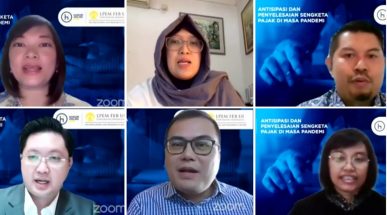TERC LPEM FEB UI and Hukumonline Hold Webinar entitled “Anticipating and Solving Tax Disputes during Pandemic”
Nino Eka Putra ~ FEB UI Public Relations Officer
DEPOK – (16/9/2020) The Tax Education and Research Center of the Economic and Community Research Institute, Faculty of Economics and Business, Universitas Indonesia (TERC LPEM FEB UI), in collaboration with Hukumonline held a webinar entitled “Anticipating and Solving Tax Disputes during Pandemic”. The webinar, which took place on Wednesday (16/9/2020), was opened by Ramos Pandia, CEO of Hukumonline, and Riatu M. Qibthiyyah, Ph.D., head of LPEM FEB UI.
Speakers at the webinar were Aniek Andriani, S.E., M.M., Substitute Clerk of the Tax Court, Henry Darmawan Hutagaol, S.H., LL.M., academician of the Faculty of Law, UI, and Mulyono, S.H., S.E., Ak., M.H., M.M., MKn, CPA, CA, CFP, CMA, Aff. WM, Managing Partner Mul & Co. The webinar was moderated by Christine Tjen, S.E., Ak., M.Int.Tax, CA., Coordinator of TERC FEB UI.
The first speaker, Aniek Andriani, explained that the Tax Court is a court of justice that performs the judiciary function with regard taxpayers or tax bearers who seek justice in tax disputes. The Tax Court is domiciled in the capital city of Jakarta. The court may hold sessions outside its offices and has so far held court sessions in Yogyakarta and Surabaya.

The Tax Court’s duty and responsibility is to investigate and issue verdicts on tax disputes based on Article 31 of the Tax Court Law. The court can only accept an application for an appeal (the Tax Court only investigates and issues decisions on disputes on verdicts over appeals), and a lawsuit (the Tax Court investigates and issues decisions on disputes over tax collection, decisions on remedies, and other decisions). The Tax Court issues verdicts based on Article 78 of the Tax Court Law, namely the results of assessments of evidence, tax regulations, and the judge’s discretion. In addition, the court can (Article 80 of the Tax Court Law) dismiss, grant in part or in full, increase the amount of tax to be paid, reject case as inadmissible, correct errors in writing or calculation, and annul prior decisions.

“During the Covid-19 pandemic, the Tax Court implements stricth health protocols, such as limiting the number of people served (administrative or court sessions), implementing online registration, scheduling of court sessions in batches, electronic court sessions for court sessions outside its offices, courtroom setting that complies with health protocols, and waiting room outside the court building. People seeking court services (to file an appeal or lawsuit) can find information about court schedule and court verdicts on tax disputes as well as other information related to the court via http://www.setpp.kemenkeu.go.id,” said Aniek.
Henry Darmawan Hutagaol, the second speaker, said that Law No.14/2002 concerning the Tax Court is an improvement of Law No.17/1997 concerning Tax Dispute Settlement Body (Badan Penyelesaian Sengketa Pajak). The change in the organizational form of the Tax Court is an improvement despite a lack of divison of the authority of the executive and judicial bodies. However, it was argued that the Tax Court is not an independent body because it falls under the jurisdiction of the executive body, namely the Minister of Finance. Still, the new law is an improvement of the previous law.
In the previous law, Tax Court judges were appointed by the president based on the list of candidates proposed by the Minister of Finance. Law No.14/2002 changed the procedure and the judicial body is involved in the appointment of Tax Court judges. The law states that Tax Court judges are appointed by the president based on the list of candidates proposed by the Minister of Finance on approval from the Head of the Supreme Court. This means that the Supreme Court has the authority to approve or reject the candidates proposed by the Minister of Finance.
“Basically, imrpovements and organizational reform of the Tax Court should continue in stages. However, the challenges towards building an ideal tax court are not easy and should be coupled with the strengthening of the legislative body to formulate regulations considering that the capacity of legislators (House of Representatives) in formulating tax regulations, particularly tax court, is far from adequate. This is our challenge in building an ideal tax court,” said Henry.

Mulyono, the third speaker, explained the procedures for appeals against decisions on tax disputes. The procedures start with a petition from the tax office, followed by investigation by tax office that will issue a tax assessment letter, an appeal filed with the regional office of the Directorate General of Taxes, an appeal filed with the Tax Court that results with a decision of the Tax Court, and a request for a review by the Supreme Court. The procedures for settlements of appeals against verdicts on tax disputes start with the issuance of a verdict, followed by appeal, and review based on Article 36 (1) of the General Rules of the Taxation Law that regulates the authority of the Director of the Directorate General of Taxation concerning lawsuits. (hjtp)
(lem)









